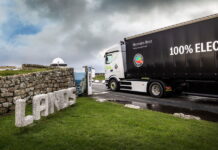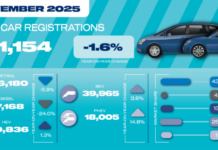After the price for ad hoc charging at EnBW charging points was reduced to €0.79/kWh in August, EnBW is also adjusting the charging prices in the EnBW mobility+ charging tariffs as of 1 December. The new charging tariffs are part of a larger price reduction for electricity, gas and heating, but these will not take effect until the turn of the year, whereas the charging tariffs will come into effect in December.The new prices in detail: The S charging tariff without a monthly base fee will be three cents per kilowatt hour cheaper from next month, with the price falling from €0.59 to €0.56/kWh. The M tariff (5.99 per month) will also be reduced by three cents to 0.46 per kWh. The top L tariff will remain at 0.39 per kWh, but the monthly basic fee will be reduced from 17.99 to 11.99. And for roaming, the lower limit for charging at other operators’ charging points will fall from 0.59 to 0.56 per kWh, while the upper limit will remain constant at 0.89 per kWh. “This means that the prices in the EnBW mobility+ charging offer are overall at the lower end of the market average. All customers will be informed individually about their price reduction in the coming days,” EnBW announced.altneuBase price charging tariff S––kWh price charging tariff S0.59 €/kWh0.56 €/kWhbase price charging tariff M5.99 €/month5.99 €/monthkWh price charging tariff M0.49 €/kWh0.46 €/kWhbase price charging tariff L17.99 €/month11.99 €/monthkWh price charging tariff L0.39 €/kWh0.39 €/kWhkWh price roaming0.59-0.89 €/kWh0.56-0.89 €/kWhCompared to the S tariff, the M charging tariff offers a price advantage of ten cents from 60 kWh per month. With the reduced basic fee, the L charging tariff is already worthwhile compared to the S option from just over 70 kWh per month – if you only or almost exclusively charge at EnBW charging points, because the familiar price range remains almost constant in all tariffs when roaming – more on this in a moment.Three cents less per kilowatt hour sounds like a rather insignificant price reduction. In an interview with electrive, Lars Jacobs, Chief Commercial Officer E-Mobility at EnBW, states that a customer on the M tariff can save up to €100 per year. “We regularly look at where we can offer our customers cost reductions or other benefits. After lowering the ad hoc prices for fast charging to €0.79/kWh in August, we are now able to offer this to all our customers across the board. Our latest price reduction means that customers on the M tariff, i.e. average consumers, can save up to €100 per year,” said Jacobs.Various factors are taken into account when calculating charging prices, such as electricity procurement, grid usage fees and investments in infrastructure. In this case, the falling grid fees at the turn of the year are one reason for the price reduction, but not the only one. On average across Germany, grid fees will fall by 1.95 cents per kilowatt hour from January, although there are some significant differences within Germany.EnBW has no plans for dynamic charging prices in the short term“We need reliable government regulations. When the government takes measures to reduce electricity costs, we pass these benefits on to our customers. Even though the electricity tax reduction for private individuals has not been implemented, there are still other encouraging developments,” Jacobs told electrive. “There is a very emotional debate about the level of charging prices. It is important to us that we are fair, reliable and predictable. Despite a lot of movement in the market, our prices have remained constant and predictable for over a year, and you don’t have to sign up for a 12-month subscription with us. Not only have we seen cost reductions, for example, the GHG quota has not developed as expected.”Jacobs intends to stick to the familiar mixed calculation and the same charging prices throughout Germany in the three tariffs (plus ad hoc option). In May, Ionity CEO Jeroen van Tilburg emphasised in an interview with electrive that dynamic charging prices are virtually his ideal scenario for the future. “We know from numerous customer surveys that our customers want precisely this predictability and reliability of consistent prices,” says the CCO of EnBW mobility+. “Of course, there is a user group that likes dynamic ad hoc prices and wants them. However, dynamic prices do not necessarily mean that things will always be cheaper. There are also times when it becomes more expensive than with a constant mixed calculation.”His explanation: the electricity price itself accounts for around 30 per cent of the charging costs, but two-thirds of this is made up of grid fees, tax components and other factors that have nothing to do with the electricity price on the electricity exchange. This electricity price only accounts for a small part of the charging price, so the impact of a change in the electricity price on the charging price would be correspondingly small.Ad hoc charging, or charging without registration with direct payment by credit card, for example, does not play a major role in EnBW’s plans. “For us, ad hoc charging is only marginally relevant. Around 95 per cent of our customers charge using a charging tariff. Electric mobility works differently from refuelling; it is a digital business.,” says Jacobs. “In my view, the comparison with petrol stations is flawed: there, it is quite normal for prices to fluctuate throughout the day or within the city and on the motorway. Our charging prices are the same at more than 7,500 EnBW fast charging points throughout Germany, regardless of when and where I charge: I know what I’m getting.”However, this only applies to EnBW’s own charging points. When roaming, the kWh prices offered by EnBW mobility+ vary depending on the operator, ranging between 0.56 and 0.89 €/kWh in future. Here too, EnBW says it will pass on positive developments to its own customers if its roaming partners charge lower B2B prices. EnBW does not want to give a specific number or percentage of how many of the more than 900,000 roaming charging points in 17 European countries fall into the new 56-cent price bracket: Such a statement could be understood as a promise that EnBW cannot keep – prices and classifications are subject to change, and new, higher-rated charging points may be added, thus affecting the percentage of low-cost charging points. All we can say is this: it should be possible to charge for €0.56/kWh when roaming at a double-digit percentage of all charging points.What Jacobs repeatedly emphasises in the interview is that despite investments in HPC charging parks along motorways and in supermarket car parks, EnBW will continue to spend money on expanding the network. “We generated a positive operating result for the first time in 2024. However, it will take a few more years before the business is able to support itself in terms of depreciation and investment costs,” says the Chief Commercial Officer E-Mobility. “As a company, we are making massive upfront investments of up to 200 million euros per year. Our fast-charging network has been expanded in line with the forecast demand for the next five years and designed so that it can be expanded as needed. In the long term, this will only be possible if the business model is profitable.”
Automobile Magazine-UK

























